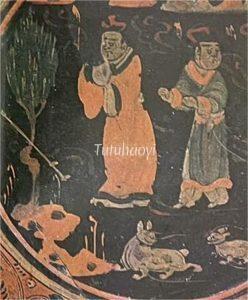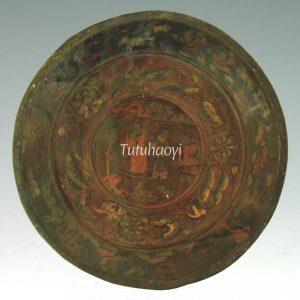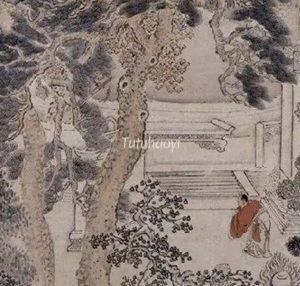Ji Zha Hanging the Sword
季札挂剑 (延陵挂剑)
© Tutuhaoyi.com owns the copyright of the description content for the images attached. Quoting all or part of the description content on this page is permitted ONLY IF ‘Tutuhaoyi.com’ is clearly acknowledged anywhere your quote is produced unless stated otherwise. (本页描述内容版权归Tutuhaoyi.com所有,转发或引用需注明 “Tutuhaoyi.com”, 侵权必究, 已注开源信息的条目除外。)
Ji Zha (季札, 576 BCE – 485 BCE) was the youngest son of King Shoumeng of Wu during the Spring and Autumn Period. According to Records of the Grand Historian: The House of Wu Taibo, Ji Zha was enfeoffed in Yanling (present-day Changzhou, Jiangsu), which is why he was also known as Yanling Jizi (延陵季子).
During one diplomatic mission, Ji Zha passed through the State of Xu. The ruler of Xu greatly admired Ji Zha’s sword, yet out of courtesy, he refrained from expressing his desire openly. Ji Zha understood the ruler’s silent wish but, pressed by the responsibilities of his assignment, could not offer the sword immediately.
After completing his duties and returning home, Ji Zha deliberately journeyed back to Xu—only to learn that the ruler had died. Saddened, he removed his treasured sword and hung it on a tree beside the ruler’s tomb before departing.
One of his attendants asked, ‘The ruler of Xu has already passed away—who is the sword for now?’
Ji Zha replied, ‘The moment I saw that he desired it, I resolved to give it to him. Why should I break my word simply because he is no longer alive?’
This poignant story of loyalty and honour has been passed down through generations. It continues to resonate in Chinese culture as a timeless example of integrity, sincerity, and moral resolve.
scene description by Rachel Ma
Fig 1-2: lacquer dish, Kingdom of Wu (222–280), Three Kingdoms, courtesy of Anhui Provincial Institute of Cultural Relics and Archaeology, China
Fig 3-4: Yanling Hanging the Sword, hanging scroll, ink and colour on paper, Zhang Hong (1577–after 1652), 1635, courtesy of the Palace Museum, Beijing



